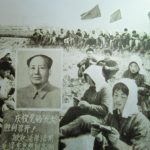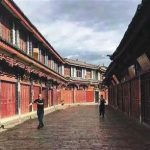Dreaded Anniversaries: The Cultural Revolution and Mao Zedong
by Lorand Laskai

On 16 May, the fiftieth anniversary of the start of the Cultural Revolution, the People’s Daily 人民日报, the mouthpiece of the CCP, published a rare commentary acknowledging the decade-long movement’s errors and costs. Putting quotation marks around the phrase ‘Cultural Revolution’ (a longstanding practice since at least the 1980s), it described the period as ‘a major complication in the development of our Party and country’. The commentary concluded that ‘We must certainly fix in our memories the historic lessons of the “Cultural Revolution” ’.1 Yet attempts online to deliberate those historic lessons, or examine the legacy of the period’s terror and violence — it swept up an entire generation in ideological-driven turmoil, scarring communities, and creating deep rifts in society — met with swift censorship. A Baidu keyword search for ‘Cultural Revolution’ 文革 in May turned up the odd slideshow or piece on historical nostalgia, but no critical discussions or detailed histories of what transpired. The silencing of discussion has affected historical memory — which is, surely, one of the objectives, given the Party’s culpability in the abuses of the period.





